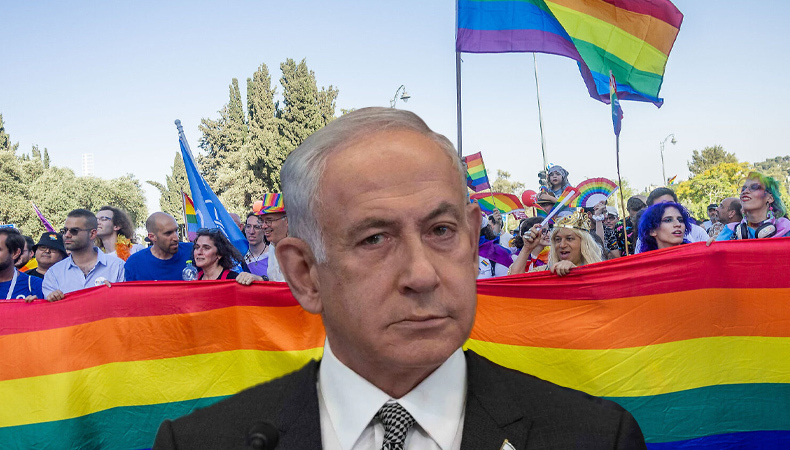Threatened Identity: Israel’s L.G.B.T.Q. Community Amidst a Right-Wing Government

Israel’s L.G.B.T.Q. community, despite having a gay speaker of Parliament, finds itself in a precarious position under the current right-wing government and its proposed judicial overhaul plan. This article explores the challenges faced by the community, particularly in relation to the Jerusalem Pride and Tolerance Parade, and sheds light on the increasing anti-gay abuse and violence in the country. Despite these threats, this article also highlights the resilience and determination of L.G.B.T.Q. activists in their fight for equal rights and recognition.
Also Read – Reversing the Trend of US Distancing: A Vital Step for Israel’s National Security
The Fractured Landscape
With the rise of the most hard-line and religiously conservative government in Israel’s history, the L.G.B.T.Q. community feels increasingly marginalized. The presence of ultraconservative members in the government, including individuals who have openly expressed homophobia, exacerbates this feeling of threat. Itamar Ben-Gvir, a far-right minister with a history of anti-L.G.B.T.Q. sentiments, was even tasked with overseeing the security of the Jerusalem Pride and Tolerance Parade, further adding to the community’s concerns.
The Jerusalem Pride Parade: A Symbol of Resilience
Traditionally, the Jerusalem Pride and Tolerance Parade has been a relatively subdued event compared to the exuberant festivities in Tel Aviv. However, this year’s parade took place at a pivotal moment, with organizers reporting an unprecedented turnout of 30,000 people. Against a backdrop of rising anti-gay abuse and violence, the L.G.B.T.Q. community stood firm, bracing for potential violence but ultimately experiencing a peaceful march protected by a significant deployment of police officers.
A Delicate Balancing Act
While Prime Minister Benjamin Netanyahu appointed Amir Ohana, an openly gay speaker of Parliament, and publicly pledged to protect gay rights, the actions and rhetoric of other government members raise concerns. The proposed judicial overhaul, which critics argue would weaken the Supreme Court, and the allocation of government funding for a deputy minister known for his homophobic views, contribute to the unease among L.G.B.T.Q. individuals.
Threats and Challenges
It is important at this juncture to highlight instances of violence in previous Jerusalem Pride Parades, including the tragic murder of 16-year-old Shira Banki in 2015. Furthermore, extremist organizations like Lehava, promote intolerance and incite hatred against minority groups. Despite the relatively small turnout of counter-demonstrators, the presence of government officials with controversial histories sends a worrisome message to the L.G.B.T.Q. community.
The Role of the Supreme Court
The Supreme Court has played a significant role in advancing L.G.B.T.Q. rights in Israel, often granting protections and rights through legal decisions. However, the proposed judicial overhaul threatens to undermine the court’s authority, leaving marginalized communities more vulnerable. Members of the L.G.B.T.Q. community, along with other sectors of Israeli society, including tech professionals, women’s organizations, and army reservists, have actively protested against this overhaul, recognizing its potential to erode Israel’s democratic foundations.
The Road Ahead
It is the need of the hour to emphasize the ongoing struggle for L.G.B.T.Q. rights in Israel. The government’s contradictory actions, the rise of anti-gay sentiments, and the threats faced by the community underscore the need for continued activism and solidarity. While some accuse the government of “pink washing,” using token gestures to divert attention from its regressive policies, others acknowledge the progress made in normalizing the gay community. Let us end on a note of hope, with the resilience and determination of L.G.B.T.Q. activists serving as a testament to their unwavering fight for equality and acceptance.
Also Read – Top Israeli general: ‘Action’ is on the horizon over Iran nuclear work
Israel’s L.G.B.T.Q. community finds itself at odds with a right-wing government that has raised concerns about the erosion of their rights and safety. The Jerusalem Pride and Tolerance Parade serves as a symbol of resilience, with activists facing potential threats but standing strong in their pursuit of equal rights. The delicate balance between the government’s promises and its actions, coupled with the proposed judicial overhaul, creates an uncertain future for the L.G.B.T.Q. community in Israel. Nonetheless, their activism, solidarity, and determination continue to pave the way for progress and change.




